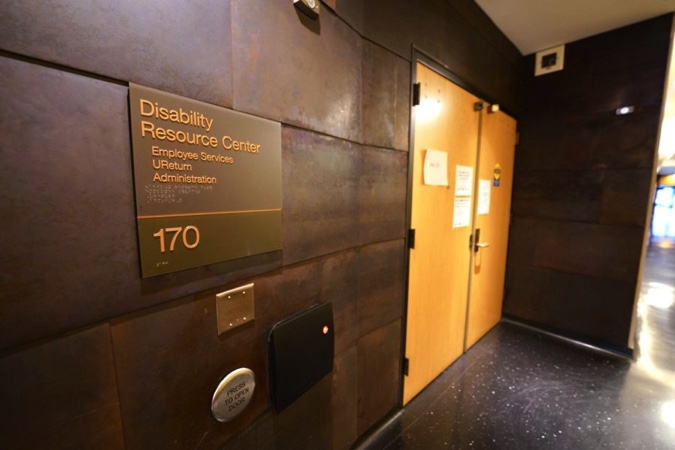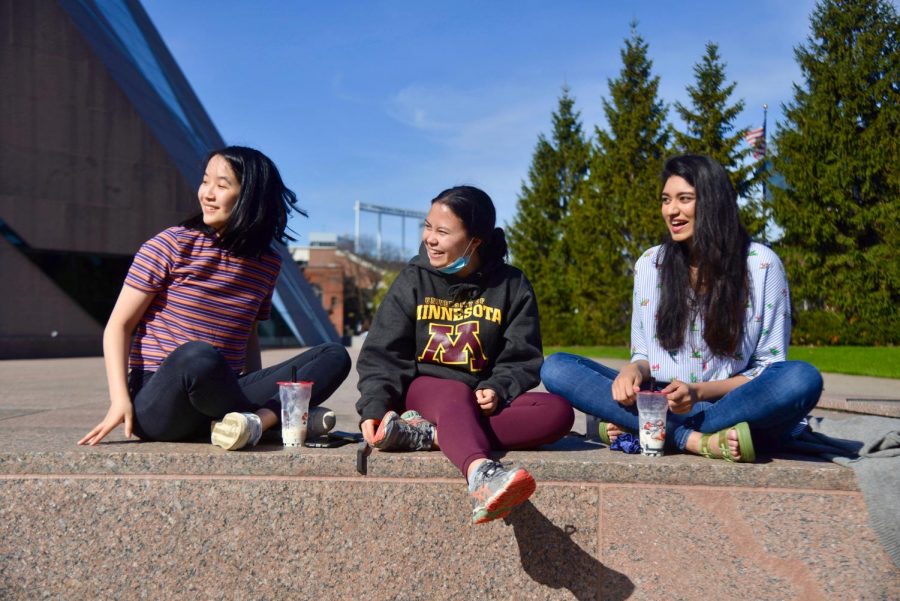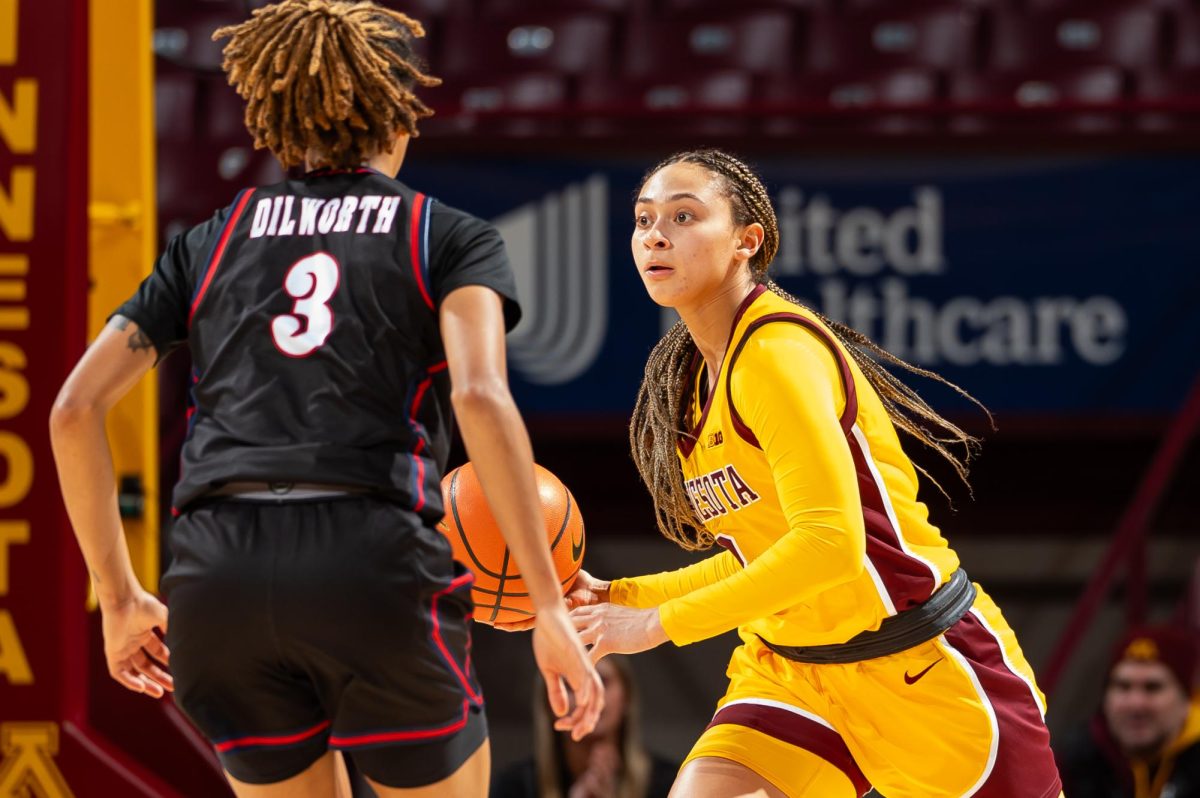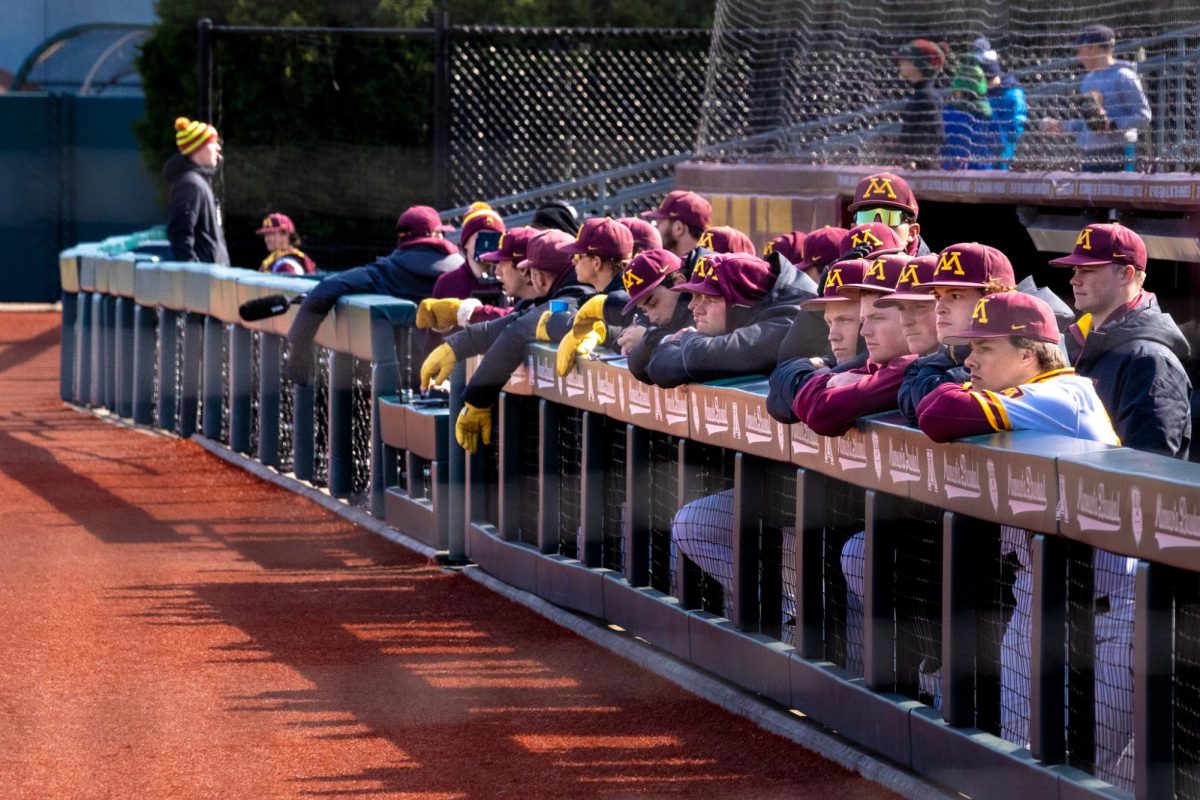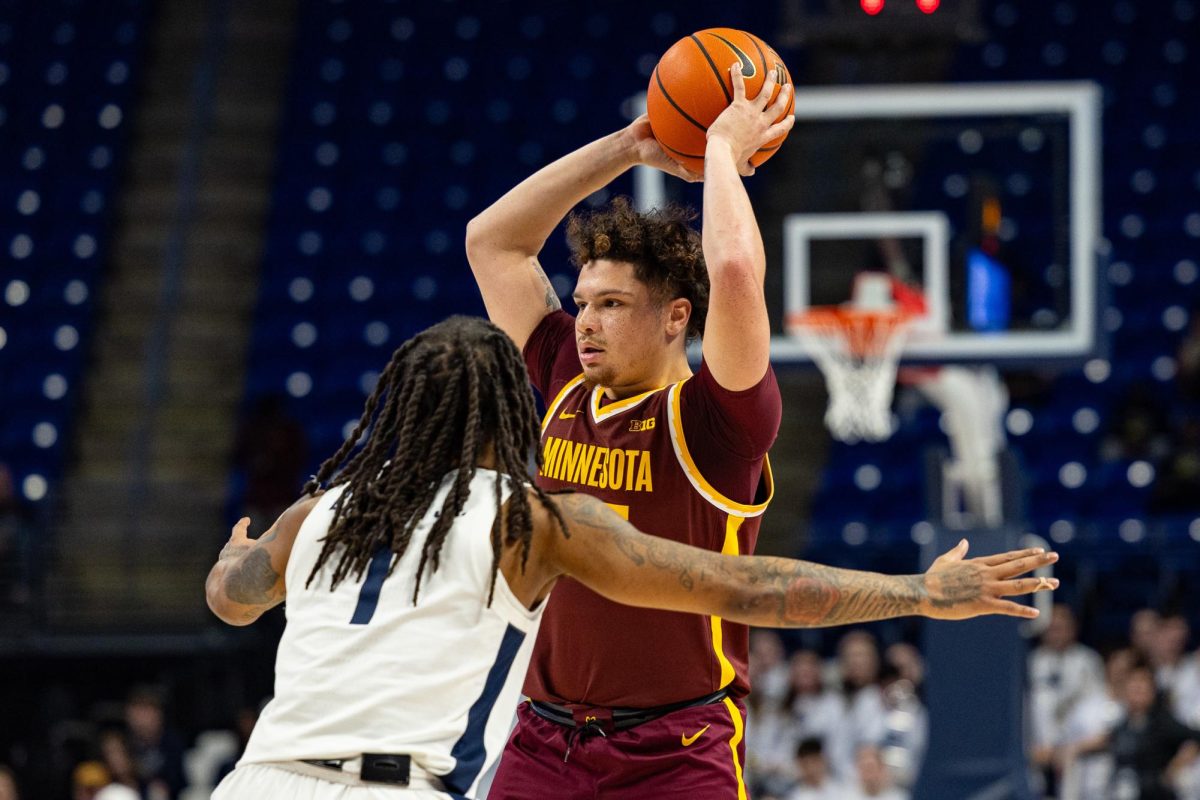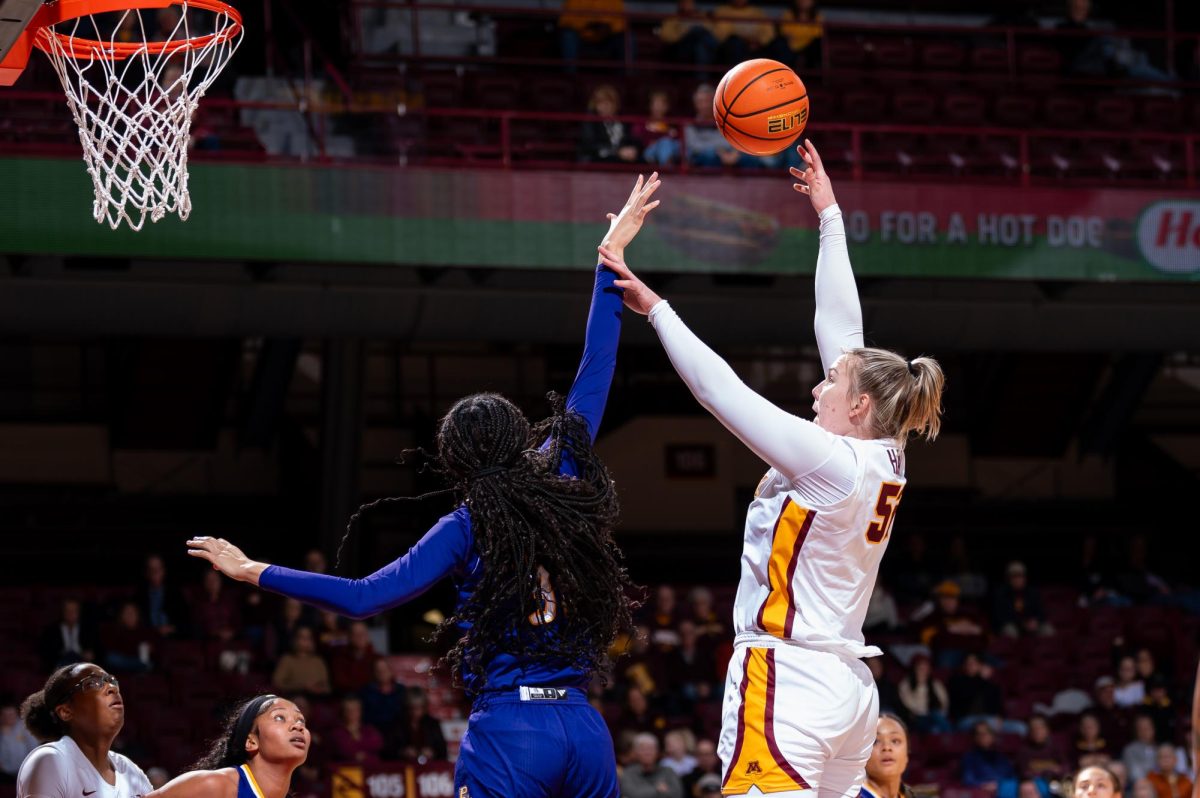Three minutes into Sunday’s WCHA championship game, the Gophers were gridlocked with the top-ranked Badgers at one goal apiece.
No. 7 Minnesota was the underdog. Wisconsin had previously won the last four games against the Gophers by a goal each.
More than a minute into the second period, freshman Olivia Knowles received a pass off a faceoff, and saw junior Taylor Williamson streaking toward the front of the net.
Knowles hit a slapshot from the blue line and Williamson redirected it past the goaltender for the go-ahead goal.
When the buzzer sounded, the Gophers took home the WCHA trophy with a 3-1 victory, which set up a rematch next Saturday against the Badgers in the NCAA tournament quarterfinals.
Minnesota would have likely missed the tournament had they not defeated their rival.
“To be back here playing the NCAA tournament is so humbling and I am just so blessed to even have this chance because at one point, that was all taken away,” Williamson said.
Almost exactly a year ago, Williamson and the Gophers were in the same position. The team was on pace to make it to a 10th consecutive NCAA Tournament, but for Williamson, something was different. She had Myasthenia Gravis, an autoimmune disease.
Discovery
In 2017, the then-sophomore from Edina began to have trouble talking. Almost every night for about 10 minutes, Williamson said it felt like there was a spoonful of peanut butter in her mouth.
She attributed it to the stress of being a student-athlete. She kept her difficulties private, only telling her mother.
After the Gophers lost in the 2017 Frozen Four final to Clarkson University in March, Williamson went on vacation with her teammates to Arizona. The feeling continued on her trip and she realized it could be serious.
Williamson returned home and went to see a doctor who performed an MRI and found something startling. A cyst the size of an avocado was on her brain. Less than 24 hours later, it was removed in emergency surgery.
“It was crazy. After the surgery, everything went back to normal. Two months later, I was back training and getting ready for the season,” Williamson said.
However, by the time training camp started in August, the same symptoms returned and were getting worse. Now, the difficulty speaking was not the only issue. She began feeling weakness in her limbs. She struggled to lift her arms and could barely hold her stick.
The season was fast approaching and Williamson went on as if everything were normal. In training camp, though, it became clear her symptoms were affecting her game. Coaches estimated her shot speed was down overall, and outside slapshots, she went from shooting 60 mph to 30 mph, and her skating stride was cut in half.
But Williamson and the team prepared for the season as usual. She participated in practices and scrimmages.
On Sept. 29 — the season opener against Merrimack College — Williamson was slated for the third line.
“I’m kind of kicking myself for having her play in that game. As I look back at that, I don’t know if she was actually ready to play,” head coach Brad Frost said.
Once Williamson was put in, she began to experience double vision, had trouble skating and could not talk. She skated off to the bench and team doctors took her to the locker room.
“That was probably the No. 1 scariest thing I have ever experienced in my life,” Williamson said.
Later that night at the hospital, she was undergoing tests to find out what was wrong. Another MRI found nothing. It was 2 a.m. when a physician’s assistant proposed a theory that was later confirmed.
Williamson had Myasthenia Gravis, or MG, an autoimmune disease.
The name originates from Latin and Greek, meaning “grave or serious muscle weakness.”
One in 300,000
Peter Karachunski, a neuroscience professor at the University of Minnesota who specializes in MG, said the disease affects about one in 300,000 people a year.
According to the National Institute of Neurological Disorders and Stroke, the disease is marked by muscle weakness, troubles in facial expression, chewing, talking and swallowing — all matching Williamson’s symptoms.
Karachunski said in normal communication between the muscle and the brain, nerves send chemicals that travel to muscles and then bind to specific receptors, which then activate and cause muscle movement.
MG disrupts the signal from nerve to muscle, he said, causing the muscles to weaken. The body’s own immune system produces antibodies, which normally protect the body from foreign organisms, but in MG, those antibodies mistakenly attack the transmitters.
“Not all muscles are affected the same way,” Karachunski said. “They can come at different severities at different times.”
Karachunski said Williamson will probably live with this disease for the rest of her life. He said some people go into remission, but it can also get worse.
After diagnosis, Williamson started rehab.
“Despite all these little things that were happening, I thought like ‘let’s just go,’” Williamson said. “It’s funny looking back on it now, I’ve had these battles my whole life and I just looked at it as another battle.”
She was put on three medications, fell back on her faith and in December, she began training with Neil Sheehy, an NHL hockey agent and specialist in muscle strengthening. By January, she was ready to be back on the ice.
Williamson credits Sheehy for her recovery.
“He basically made the impossible, possible,” she said.
The first goal
Williamson saw the ice for the first time since September in the second game against Vermont on Jan. 13, more than three months after she was diagnosed.
It was only for one shift, but Williamson had been waiting to return to the real thing. The team points to Williamson’s comeback as inspiration for finishing out the season.
“Taylor is a warrior, and our whole team has watched her throughout the whole season deal with a lot of question marks and adversity and she has handled that uncertainty with so much strength and maturity,” senior goaltender Sidney Peters said. “When you watch your teammates go through something like that, it gives you no excuse.”
Williamson was happy to be back. She physically felt okay, but didn’t feel comfortable until her third week back in February’s game against St. Cloud State.
With 4:35 left in the first period, sophomore Lindsay Agnew passed the puck to Williamson and she flipped the puck into the net for her first goal since returning from MG.
The game ended in a tie, but it was a milestone for Williamson.
“To finally get that puck in the net was just an incredible moment,” she said. “Right now, it’s just about enjoying it and never taking a shift for granted. [I’m] just so blessed to come back from battling MG.”
Williamson has scored three goals since her return. Frost said she looks better than before her diagnosis. The third line has blitzed opponents, scoring 16 points overall.
“This past year has been indescribable,” Williamson said. “I have found things and discovered things about myself I didn’t even know, faced struggles I didn’t even know existed.”




